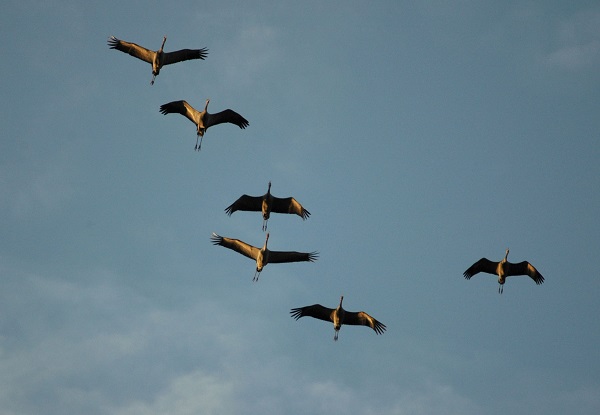 Common cranes;
Credit: Patric Lorgé
Common cranes;
Credit: Patric Lorgé
In the latest in a series of articles about current conservation issues, experts at natur&ëmwelt, a leading nature conservation NGO in Luxembourg, spoke to Chronicle.lu about bird migration, why it takes place and what role we can play to help birds during cold, food-scarce winter days.
Natur&ëmwelt volunteer David Crawford helped collect the relevant information from the NGO for this article.
Chronicle.lu: Most of us know by now about bird migration and the astonishing distance that some birds cover. But why do they do it?
Natur&ëmwelt: Simple answer: because they're genetically programmed to. Essentially they have no option. That's what their "conspecifics" (birds of the same species) have been doing for generations immemorial.
Chronicle.lu: Fair enough. But behind that simple answer, there is more, is there not? For example, why did they establish this as their unchanging lifestyle in the first place?
Natur&ëmwelt: Yes, of course - there's reason to this apparent madness. And the reason is the quest for food. Summer migrants come here, for less than half the year, because of the long daylight hours and the super-abundance of insects with which they feed themselves and their young. As soon as the days get noticeably shorter, "migratory restlessness" sets in and they have to leave.
Chronicle.lu: And in that way, they get the best of both worlds?
Natur&ëmwelt: Sort of. Migratory journeys are always fraught with danger, so the end result of this epic twice-yearly trip has to be worthwhile. And conditions in the birds' wintering grounds, while an improvement on our cold, dark European winter, are only so-so. Around the equator, day and night are of equal length and non-seasonal. So birds can survive the winter there but they prefer to breed and raise their young in our summer conditions.
Chronicle.lu: It seems then that it is not so much a question of why some species migrate as why so many do not. What is the advantage of staying here?
Natur&ëmwelt: To put it in rather frivolous terms, birds appear to like a bet. In the sense that they "bet" they can survive short days and long nights in order to be where they want to breed when the weather turns and the mating urge sets in. Our year-round residents know the place intimately; they know where the best nest sites are and they'll occupy them and defend them long before the migrants arrive and have to make do with second best.
Chronicle.lu: Should we be helping them to survive the lean period by putting food out?
Natur&ëmwelt: By all means, so long as it's good-quality bird food. Feeding garden birds isn't a game-changer, though - it won't save the planet. But it helps our "local" birds over a tricky period, and it gives us humans pleasure. So essentially it's a win-win.
Chronicle.lu: You have put inverted commas around "local" birds - do we have intruders?
Natur&ëmwelt: Not intruders, but migrants - from much further north. Don't forget that the shift in seasons is even more marked in the far north of Eurasia: from almost total daylight in summer to almost total darkness in winter. So, lots of birds journey south from there in autumn and finish up in the "tropical" climes of Luxembourg. For them, seven to eight hours of weak daylight is heaven!
Chronicle.lu: Getting back to our summer migrants, do we know where our breeding species have spent the winter and where they will be heading when they leave us?
Natur&ëmwelt: We're learning more and more - from ringing recoveries in the birds' wintering grounds, and now from tiny transmitters on the birds' back. Most of our long-distance migrants follow the western flyway, which takes them across France, around the Pyrenees and through Spain to the Strait of Gibraltar. Then it's down the west coast of Africa and into the Sahel zone south of the Sahara, though a few intrepid species take a deep breath and fly straight across the Sahara: 48 hours, non-stop! And they'll do it all again in the spring, just to be with us. Isn't it nice to have them around?








